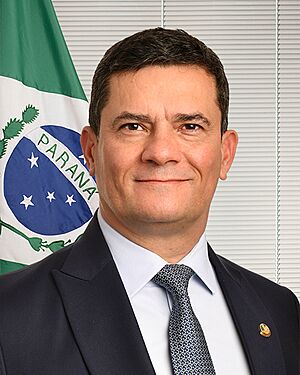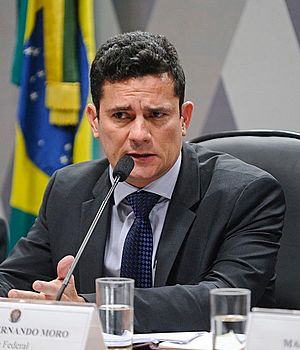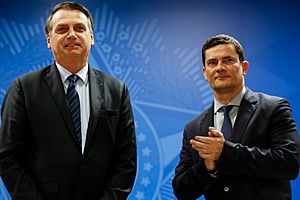Sergio Moro facts for kids
Quick facts for kids
Sergio Moro
|
|
|---|---|

Official portrait, 2023
|
|
| Senator for Paraná | |
| Assumed office 1 February 2023 |
|
| Minister of Justice and Public Security | |
| In office 1 January 2019 – 24 April 2020 |
|
| President | Jair Bolsonaro |
| Preceded by | Torquato Jardim (Justice) Raul Jungmann (Public Security) |
| Succeeded by | André Mendonça |
| Personal details | |
| Born |
Sergio Fernando Moro
1 August 1972 Maringá, Paraná, Brazil |
| Political party | Podemos (2021–2022) Brazil Union (2022–present) |
| Spouse |
Rosângela Wolff
(m. 1999) |
| Children | 2 |
| Alma mater | State University of Maringá (LLB) Federal University of Paraná (LLM, PhD) |
| Signature | |
Sergio Fernando Moro (born August 1, 1972) is a Brazilian jurist (a legal expert), a former federal judge, a college professor, and a politician. He was elected to the Federal Senate for the state of Paraná in October 2022.
In 2015, he became well-known as one of the main judges in Operation Car Wash (Operação Lava Jato). This was a big investigation into corruption and bribery involving government officials and business leaders. Moro also served as the Minister of Justice and Public Security under President Jair Bolsonaro from 2019 to 2020.
After the 2018 election, President-elect Bolsonaro asked Moro to be his Minister of Justice. Moro accepted this role. Many people praised his appointment and his work on Operation Car Wash. However, some people criticized him, especially after questions were raised about whether he was fair during the investigations. Moro left the government in April 2020. He said the President was interfering too much in his ministry's work.
Later, messages that were leaked raised more questions about Moro's fairness during the Operation Car Wash investigations. Moro has publicly disagreed with these claims. In 2021, the Supreme Federal Court decided that Moro had indeed been biased in some cases. In 2022, the United Nations Committee also agreed with this decision.
Contents
Early Life and Learning
Sergio Moro was born in Maringá, Brazil. His father, Dalton Áureo Moro, was a geography professor. Sergio's family has roots from different countries, including Italy, Germany, Portugal, Spain, and Poland.
Moro earned a law degree from the State University of Maringá in 1995. He also studied at Harvard Law School in 1998, where he learned about fighting financial crimes. He continued his studies at the Federal University of Paraná, earning a master's degree in 2000 and a PhD in State Law in 2002. In 2007, he took part in a program to learn more about preventing financial crimes in the United States.
His Career Path
In 1996, Moro began teaching law at the Federal University of Paraná. In the same year, he became a federal judge in Porto Alegre. He later moved to Joinville, Santa Catarina, in 1999. From 2003 to 2007, Moro worked on a case involving a public bank. This investigation led to many arrests for financial crimes.
In 2012, he helped with another big case called the Mensalão scandal. He was asked to help because of his experience with financial crimes. After leaving his judge role and the government, Moro worked as a lawyer for a short time. He also worked for a consulting company called Alvarez & Marsal.
Operation Car Wash: Fighting Corruption
In 2014, while working in Curitiba, Sergio Moro became a lead judge in Operation Car Wash (Operação Lava Jato). This was a huge investigation that started with a financial crime case. It grew into a major effort to uncover corruption, bribery, and misuse of public money by politicians and officials.
The investigation moved very quickly, which was unusual for Brazil. Moro allowed many investigations, arrests, and questioning of suspects. By late 2017, many people had been sentenced and sent to jail. Even though some legal experts criticized him, Moro became very popular with the Brazilian people. He was seen as a key figure in the fight against corruption.
Most of Moro's decisions and sentences were supported by higher courts. However, in 2021, due to questions about his fairness, some of the decisions in Operation Car Wash were reviewed by the Supreme Federal Court.
In 2017, Moro sentenced former Brazilian president, Luiz Inácio Lula da Silva, to jail for corruption. This decision caused a lot of discussion in Brazil. Many people supported the judge, while others felt he was going too far. In 2021, the Supreme Court of Brazil overturned this decision, stating that Moro had acted with partiality. The UN human rights committee also agreed with this decision in 2022.
Serving as Minister of Justice
Sergio Moro had often said he was "apolitical" and not interested in politics. However, after the 2018 Brazilian general election, rumors spread that President-elect Jair Bolsonaro wanted him to lead the Ministry of Justice. On November 1, 2018, Moro met with Bolsonaro and it was announced he would become a minister.
Many judges supported his new role. But some people who opposed Bolsonaro, and some in the media, criticized the decision. They felt that Moro's sentencing of former president Lula had helped Bolsonaro win the presidency.
During his 15 months as Minister of Justice and Public Security, Moro focused on fighting organized crime and improving border security. He also worked on new anti-corruption measures. Crime rates in Brazil fell in 2019, but it's not clear if this was directly due to government actions.
As 2020 began, the relationship between Moro and Bolsonaro became difficult. Moro started to complain that the president was interfering in his ministry. Moro said that Bolsonaro had promised him independence to run the ministry, especially in choosing leaders for the Federal Police. However, this changed over time. Moro also disagreed with Bolsonaro's handling of the COVID-19 pandemic.
On April 24, 2020, Moro announced he would leave the Ministry. He said he was leaving because the president had removed the Federal Police's Director-General without good reason. Moro then started a career as a lawyer.
His Political Journey
As a judge, Moro often said he would not have a political career. However, he began his political journey in November 2018 when he accepted the invitation to be the Minister of Justice. He later joined the political party Podemos on November 10, 2021. He announced he was considering running for president of Brazil.
Moro was seen as a possible "third way" candidate, different from the main candidates. However, after leaving the Podemos party, he decided not to run for president. His popularity changed, partly because he joined Bolsonaro's government and because of the questions about fairness in the "Car Wash" investigation.
Personal Life
Moro is married to Rosângela Wolff de Quadros, who is also a lawyer. They live in Curitiba and have two school-aged children. Not much is known about his private life, but he is described as having a "reserved lifestyle and simple habits."
He is a Roman Catholic.
Sergio Moro was played by actor Marcelo Serrado in the 2017 Brazilian film Polícia Federal: A Lei É para Todos.
See also
 In Spanish: Sergio Moro para niños
In Spanish: Sergio Moro para niños



